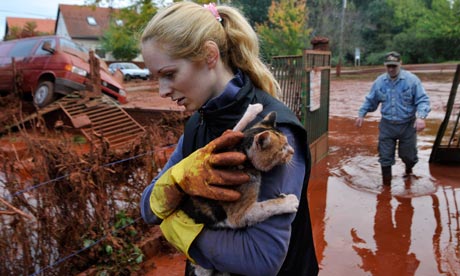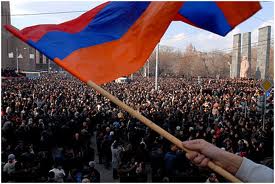
STATE OF EMERGENCY |
| __________________________________________________________________________________________________________________________________________________________________________ |
 |
'In October 2010, the Hungarian government has declared a state of emergency after a third person died in flooding from a ruptured red sludge reservoir at an alumina plant. Six people were missing and 120 injured in what officials said was an ecological disaster'. |
A state of emergency is a governmental declaration that may suspend some normal functions of the executive, legislative and judicial powers, alert citizens to change their normal behaviours, or order government agencies to implement emergency preparedness plans. It can also be used as a rationale for suspending rights and freedoms, even if guaranteed under the constitution. Such declarations usually come during a time of natural or man made disaster, during periods of civil unrest, or following a declaration of war or situation of international or internal armed conflict. Justitium is its equivalent in Roman law. It is a necessary function of the state and in cases a tool for dictatorship. In some countries, the state of emergency and its effects on human rights and freedoms and governmental procedure are regulated by the constitution and/or a law that limits the powers that may be invoked. Rights and freedoms may be suspended during an emergency, for instance, freedom of movement, but not non-derogable rights. In many countries it is illegal to modify the emergency law or the constitution during the emergency. |
| USE and VIEWPOINTS
Though fairly uncommon in democracies, dictatorial regimes often declare a state of emergency that is prolonged indefinitely for the life of the regime. In some situations, martial law is also declared, allowing the military greater authority to act. In other situations, emergency is not declared and de facto measures taken or decree-law adopted by the government. United Nations have recommended to the international community to adopt the following "principles" to be observed during a state or de facto situation of emergency: Principles of Legality, Proclamation, Notification, Time Limitation, Exceptional Threat, Proportionality, Non-Discrimination, Compatibility, Concordance and Complementarity of the Various Norms of International Law . (cf: "Question of Human Rights and State of Emergency", E/CN.4/Sub.2/1997/19, at Chapter II) Article 4 to the International Covenant on Civil and Political Rights (ICCPR), permits states to derogate from certain rights guaranteed by the ICCPR in "time of public emergency". Any measures derogating from obligations under the Covenant, however, must only be to the extent required by the exigencies of the situation, and must be announced by the State Party to the Secretary-General of the United Nations. The European and American Conventions on Human Rights have similar derogatory provisions. No derogation is permitted to the International Labour Conventions. Some political theorists have argued that the power to decide the initiation of the state of emergency defines sovereignty itself. However, it is argued that the mechanism of the state of emergency deprives certain people of their civil and political rights. ABUSE The state of emergency can be abused by being invoked, for example, to allow a state to suppress internal opposition without having to respect human rights. An example was the August 1991 attempted coup in the Soviet Union (USSR) where the coup leaders invoked a state of emergency; the failure of the coup led to the dissolution of the Soviet Union. Derogations by states having ratified or acceeded to binding international agreements such as the ICCPR, the American and European Conventions on Human Rights and the International Labour Conventions are monitored by independent expert committees, regional Courts and other State Parties. Euro-crisis, coming China elections, Arab uprising and disasters makes the subject topical again. Calling a 'state of emergency' plays a some crucial role, for a recognized state has the right to exist. Existance of emergency laws can unlash power but should be always used under the rule of law. TOPICAL Related to the middle East and in North Africa, the following developments connected to the state of emergency are worth to mention: Egyptians lived under an Emergency Law (Law No. 162 of 1958) from 1967 to 2012, except for an 18-month break in 1980. The emergency was imposed during the 1967 Arab-Israeli War, and reimposed following the assassination of President Anwar Sadat. The law continuously extended every three years since 1981. Under the law, police powers were extended, constitutional rights suspended and censorship was legalized. The law sharply circumscribed any non-governmental political activity: street demonstrations, non-approved political organizations, and unregistered financial donations were formally banned. Some 17,000 people were detained under the law, and estimates of political prisoners run as high as 30,000. The emergency rule expired on May 31, 2012 after 31 years in force. Libya does not have a constitution. 25 February 2011 the national state of emergency was called. Syria ended the state of emergency, in effect for nearly 50 years, on Thursday 21 April 2011 in an attempt to defuse mass protests against his authoritarian rule that have gripped the country for over a month. |
EXAMPLES IN EUROPE
|
 |
|---|
|
|---|